Read, hot & digitized: Librarians and the digital scholarship they love — In this series, librarians from the Libraries’ Arts, Humanities and Global Studies Engagement Team briefly present, explore and critique existing examples of digital scholarship to encourage and inspire critical reflection of and future creative contributions to the growing fields of digital scholarship.
Together with diaries and memoirs in print, audio-visual testimonies are primary sources that shed light on the lived experience of people who experienced the Holocaust. There are a few institutions around the world that produce, curate, and publish such testimonies;[1] one of them is the Fortunoff Video Archive for Holocaust Testimonies at Yale university. The mission of the Fortunoff archive is to “record and project the stories of those who were there.” Established in 1981, and based on a donation of testimonies previously videotaped since 1979 by The Holocaust Survivors Film Project, the archive works to record, collect, and preserve Holocaust witness testimonies, and to make its collection available to researchers, educators, and the general public.[2]
Fred Alford, professor emeritus of the university of Maryland, researches the way trauma becomes embedded in nations, societies, and groups[3]; upon his research in the Fortunoff archive, he asserted that “testimonies are important [because they] make a historical abstraction real.”[4] Witnesses remind us that the Holocaust was made of people, victims, and executioners. He argues that a proper psychoanalytic interpretation can help us understand not merely the suffering of survivors, but can remind us of an equally important fact: “…. that for every torment there was a tormenter, for every degradation a degrader, for every humiliation one who inflicted it. For every death a murderer……”
He goes on to say that “We listen to witnesses in order to understand their suffering, and we seek to understand their suffering in order to understand better regimes of organized terror and the role they play in our lives……We listen to witnesses in order to remember better that their suffering comes at the hands of regimes that are made of people.”[5]
The Fortunoff archive currently holds more than 4,400 testimonies, which are comprised of over 12,000 recorded hours. Testimonies were produced in cooperation with 36 affiliated projects across North America, South America, Europe, and Israel. The archive and its affiliates recorded the testimonies of willing individuals with first-hand experience of the Nazi persecutions, including those who were in hiding, survivors, bystanders, resistants, and liberators. Testimonies were recorded in whatever language the witness preferred, and range in length from 30 minutes to over 40 hours (recorded over several sessions).
While the database allows for various searching, sorting, and limiting options – using the Library of Congress Subject Headings (LCSH) as a form of a common controlled vocabulary – it also has more advanced Digital Humanities tools which were developed together with the Yale DHLab.
Let them speak (LTS) is a digital anthology of testimonies from three different collections – United States Holocaust Memorial Museum (USHMM), the Shoah Foundation at the University of Southern California (USC VA), and the Fortunoff archive. The anthology includes a search tool that employs corpus query language which allows for more sophisticated searches like Lemma searches. The goal is to demonstrate the value of these linguistics tools for exploring large numbers of audiovisual materials, as well as make a first attempt to bring collections of testimonies into the same digital space. The LTS tool is slated to go live by December 2020.
The Collection metadata dashboard is a visual representation of the collection descriptions, as it allows filtering by various parameters, such as date (birth year and recording year), birth place, subject, gender, language of testimony, and affiliate programs from which testimonies were received. One could access each testimony directly from the dashboard. A useful functionality is the ability to search for subject headings in the dashboard and limit the results further by additional parameters. For example, a search for the term “childbirth” would reveal five subject headings related to the term; clicking on “childbirth in concentration camps” would bring up 98 testimonies.
The Testimony citation database shows data on cited testimonies, publications that cited them, and the authors of those publications. Some authors’ names are linked to the author’s website, their page on the OCLC WorldCat Identities database, or their authority file on the Virtual International Authority File (VIAF) database. Searching for Fred Alford, the scholar cited above, one would realize that he has made 60 citations to 26 testimonies in 5 publications. These testimonies and publications are linked from the results page.
The Fortunoff archive is open to any student or researcher either on site, or online through an ‘access site.’ Currently there are 84 access sites around the world in academic libraries, museums, and research centers. The University of Texas Libraries has joined the project as an access site in summer 2019. The archive is accessible to UT affiliates both on and off campus, as well as to non-UT walk-in visitors on campus. All users would need to create an account with Yale’s Aviary, the archive’s digital access system. Searching and browsing is done through that personal account. There is no cost involved. UT affiliates could also access their Aviary account, and the archive, through a proxy connection to UT and/or a VPN.
The UT Libraries holds 390 items (in print and online) that deal with personal narratives and testimonies of holocaust survivors. Most of these items are autobiographies or diaries, while others are audiovisual materials, research and analysis of personal narratives, and collections of individual testimonies. The Fortunoff database itself is also accessible through the library catalog.
[1] The United States Holocaust Memorial Museum (USHMM), The Yad Vashem Museum in Jerusalem, The British Library (London), and The University of Southern California (USC) Shoah Foundation.
[2] https://fortunoff.library.yale.edu/about-us/our-story/
[3] https://gvpt.umd.edu/facultyprofile/alford/c-fred
[4] Alford, C. Why Holocaust Testimony is Important, and how Psychoanalytic Interpretation can Help…but only to a Point. Psychoanal Cult Soc 13, 221–239 (2008). https://doi.org/10.1057/pcs.2008.16
[5] Ibid.

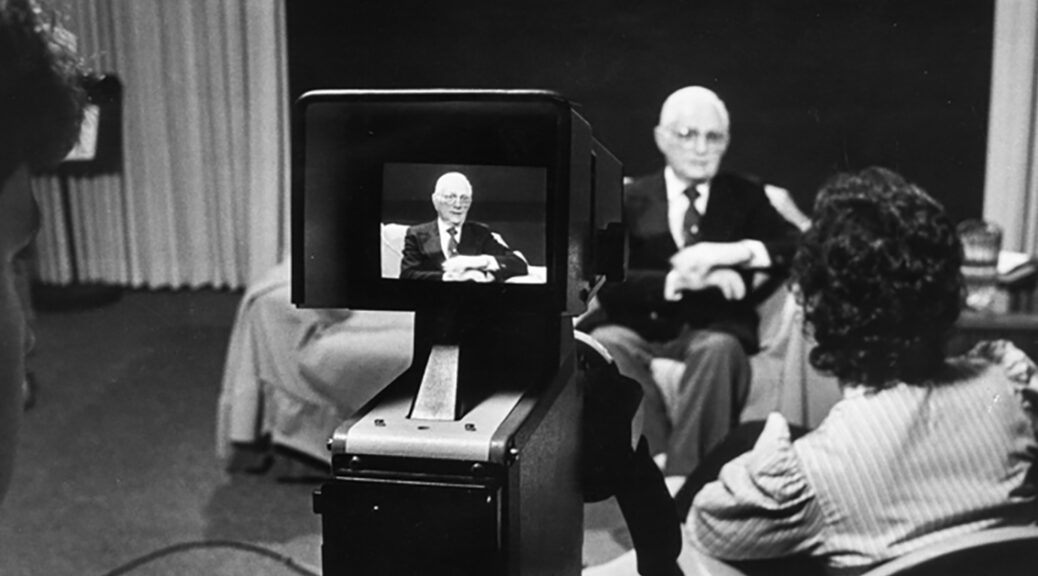
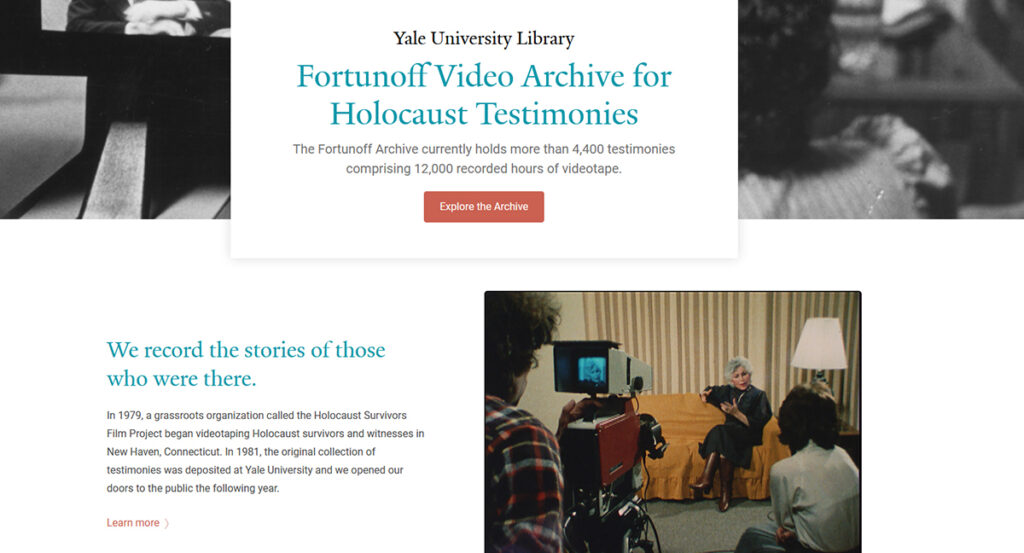
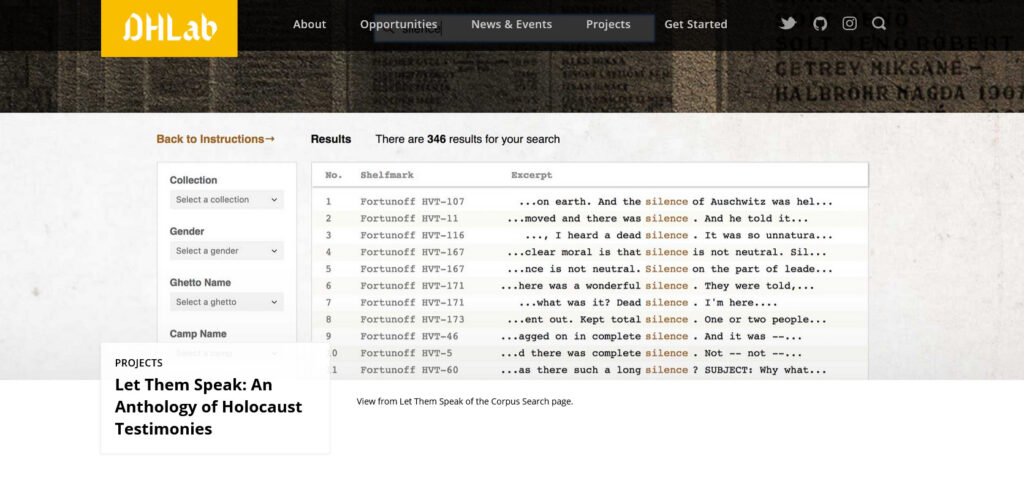
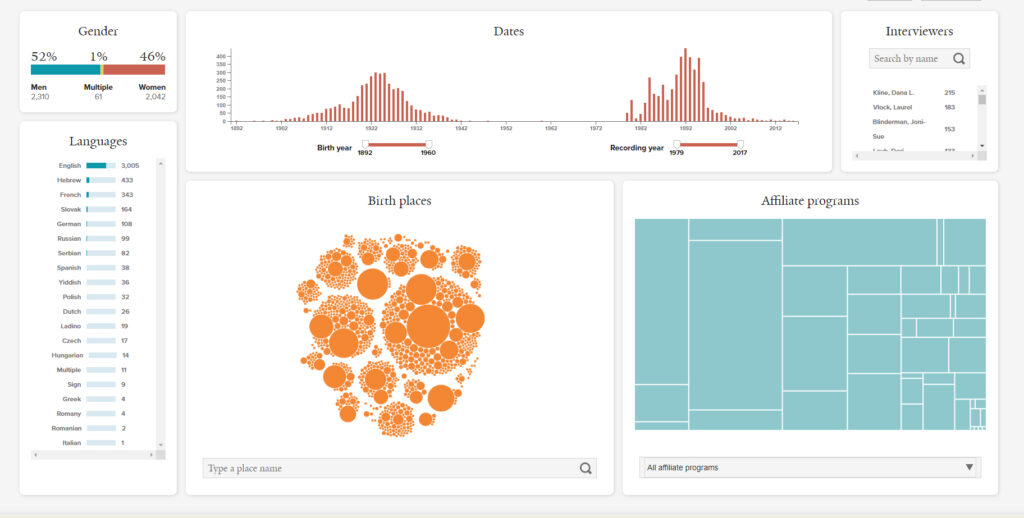
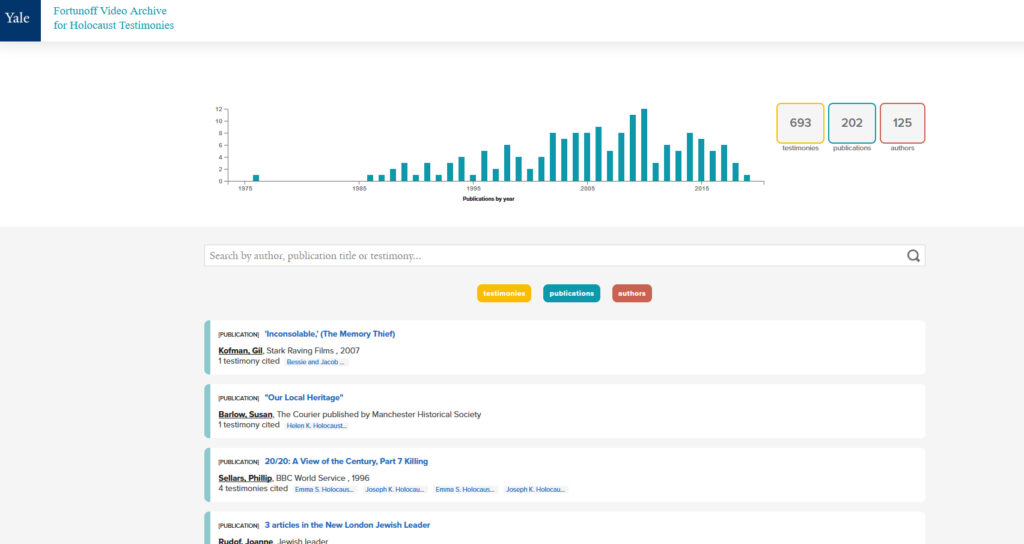
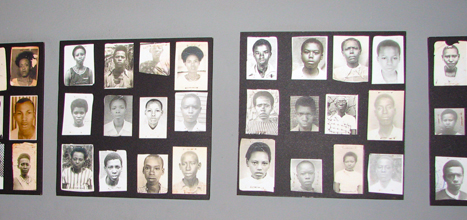
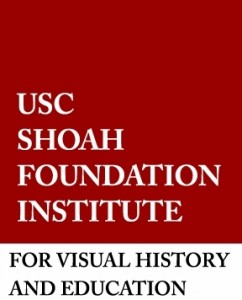 On March 10-11, 2010 the
On March 10-11, 2010 the